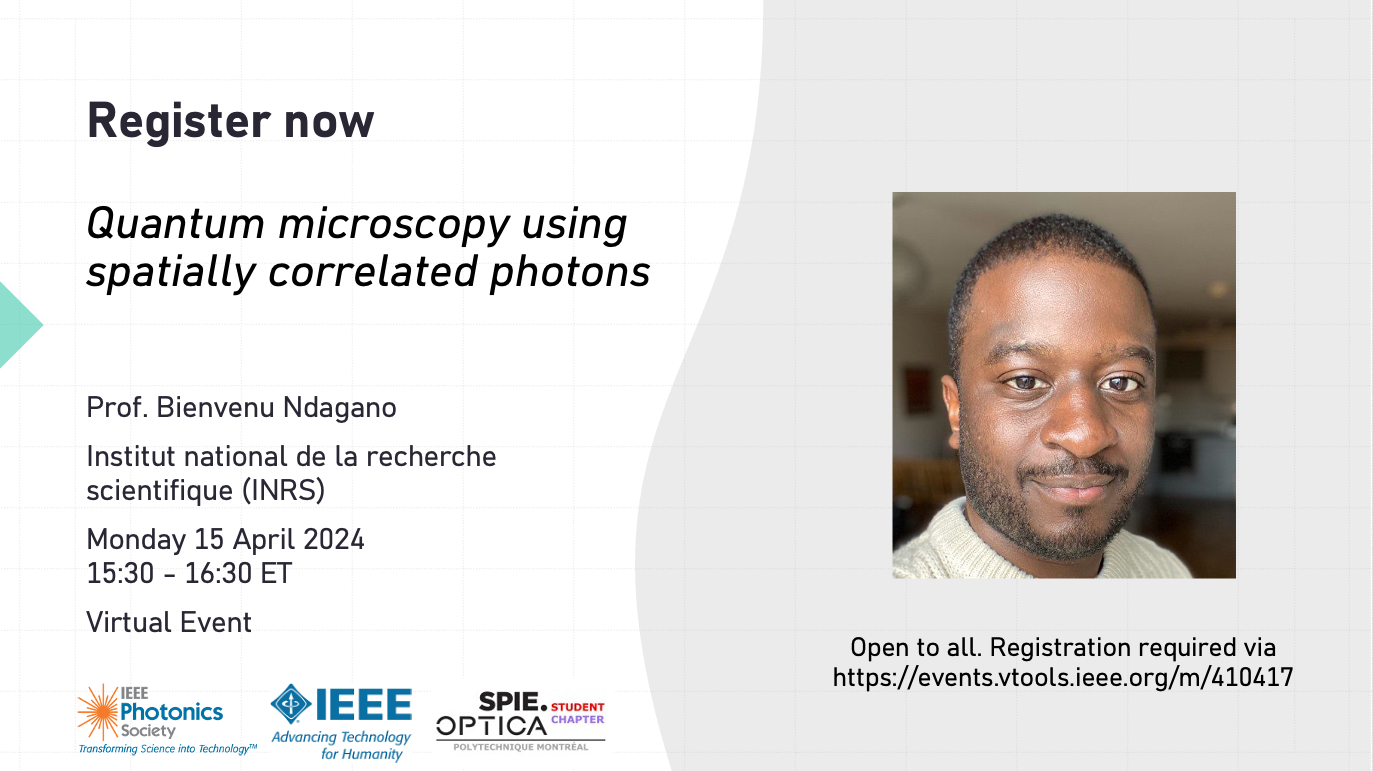Virtual Talk: Quantum microscopy using spatially correlated photons / Microscopie quantique en utilisant des photons spatialement corrélés
La présentation sera en anglais / The presentation will be given in English.
*Please note that this presentation will be given as a fully virtual event. Webinar access information will be communicated to IEEE members and registered people. Please contact the hosts for more information.
* Veuillez noter que cette présentation sera donné de façon virtuelle. Les informations d'accès au webinaire seront communiquées aux membres de l'IEEE et aux personnes inscrites. Veuillez contacter les organisateurs pour plus d'informations.
Abstract: Exploiting spatial correlations between photons is a fundamental in quantum imaging. Correlation-based imaging, a scheme whereby one photon from a pair interacts with an object before reaching the detection system. The joint measurement of the two photons then reveals the image of the object. Though the image reconstruction was initially implemented using computational techniques that employ a single pixel with no spatial resolution on its own, modern implementations can make use of arrays of single-photon sensitive detectors. Novel imaging sensors such as arrays of single photon avalanche diodes (SPADs) have enabled two- and three-dimensional imaging, the latter being enabled by the high temporal resolution. Furthermore, their high-frame rate, compared to rival technology, dramatically reduces the acquisition time required to spatially characterise quantum states and form a correlation image. In this talk, we will provide an overview of the recent developments in 2D, and 3D correlation-based imaging using photon pairs and enabled by SPAD cameras. Particularly, we will focus on optical designs geared towards applications in microscopy.
Date and Time
Location
Hosts
Registration
-
 Add Event to Calendar
Add Event to Calendar
Loading virtual attendance info...
- Contact Event Hosts
-
Chapitre Étudiant SPIE/OPTICA - Polytechnique . Contact: jennyfer.zapata-farfan@polymtl.ca
- Co-sponsored by Chapitre Étudiant SPIE/OPTICA - Polytechnique
Speakers
Bienvenu Ndagano of Institut national de la recherche scientifique (INRS)
Quantum microscopy using spatially correlated photons
Abstract: Exploiting spatial correlations between photons is a fundamental in quantum imaging. Correlation-based imaging, a scheme whereby one photon from a pair interacts with an object before reaching the detection system. The joint measurement of the two photons then reveals the image of the object. Though the image reconstruction was initially implemented using computational techniques that employ a single pixel with no spatial resolution on its own, modern implementations can make use of arrays of single-photon sensitive detectors. Novel imaging sensors such as arrays of single photon avalanche diodes (SPADs) have enabled two- and three-dimensional imaging, the latter being enabled by the high temporal resolution. Furthermore, their high-frame rate, compared to rival technology, dramatically reduces the acquisition time required to spatially characterise quantum states and form a correlation image. In this talk, we will provide an overview of the recent developments in 2D, and 3D correlation-based imaging using photon pairs and enabled by SPAD cameras. Particularly, we will focus on optical designs geared towards applications in microscopy.
Biography:
Prof. Ndagano is an early-career researcher that has recently been hired at INRS-EMT where he holds the MEIE chair in quantum photonics. His mission is to develop novel research avenues in quantum sensing and communication. Prof. Ndagano has 10 years of experience, in both academia and industry, working on tools and techniques to harness quantum features of light for sensing and communication; this includes engineering, control and measurement of quantum states and their correlations. He holds a PhD from the University of the Witwatersrand in South Africa where his research focused on structured light exhibiting classical entanglement correlations, as well as their applications to classical and quantum communication. Prof. Ndagano went on to hold a research associate position at the University of Glasgow where he developed an expertise in quantum imaging using SPAD cameras. Most notably, his research led to the development of a proof-of-principle quantum microscope enabled by quantum interferometry. His last stop before joining INRS was at the Fraunhofer Centre for Applied Photonics in Glasgow, developing quantum technologies for industrial customers. Some notable projects on which Prof. Ndagano worked involved the development of a nonlinear imaging LIDAR system and a high-repetition-rate source of entangled photons.
Email:


